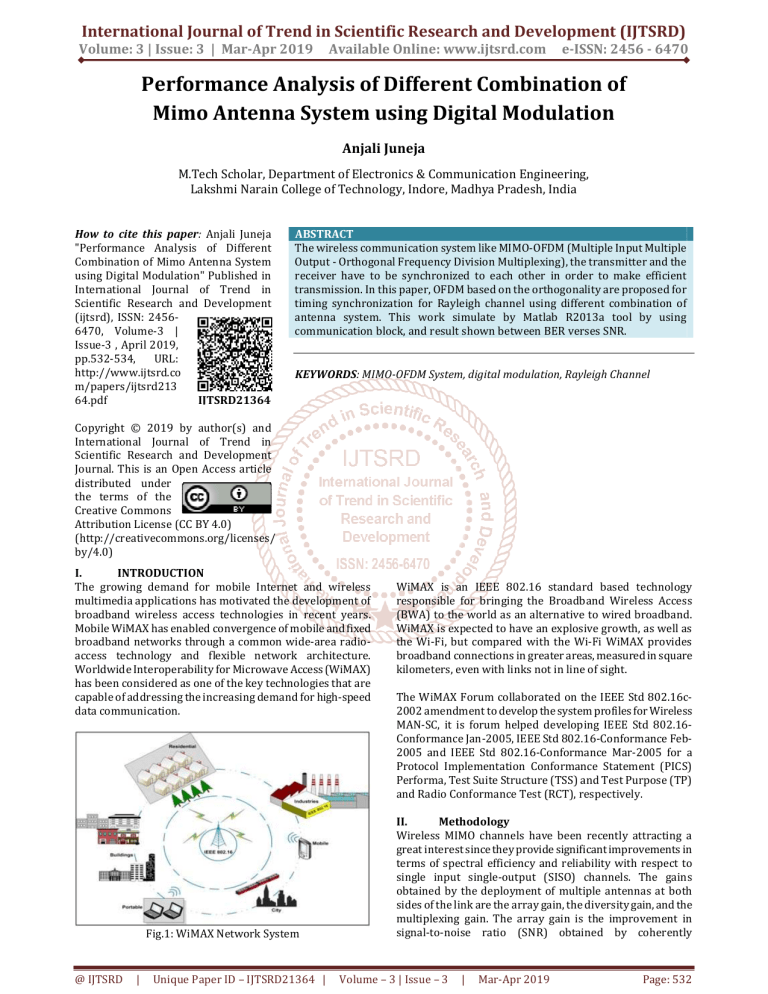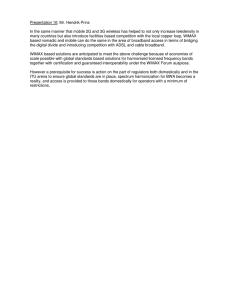
International Journal of Trend in Scientific Research and Development (IJTSRD)
Volume: 3 | Issue: 3 | Mar-Apr 2019
Available Online: www.ijtsrd.com
e-ISSN: 2456 - 6470
Performance Analysis of Different Combination of
Mimo Antenna System using Digital Modulation
Anjali Juneja
M.Tech Scholar, Department of Electronics & Communication Engineering,
Lakshmi Narain College of Technology, Indore, Madhya Pradesh, India
How to cite this paper: Anjali Juneja
"Performance Analysis of Different
Combination of Mimo Antenna System
using Digital Modulation" Published in
International Journal of Trend in
Scientific Research and Development
(ijtsrd), ISSN: 24566470, Volume-3 |
Issue-3 , April 2019,
pp.532-534,
URL:
http://www.ijtsrd.co
m/papers/ijtsrd213
64.pdf
IJTSRD21364
ABSTRACT
The wireless communication system like MIMO-OFDM (Multiple Input Multiple
Output - Orthogonal Frequency Division Multiplexing), the transmitter and the
receiver have to be synchronized to each other in order to make efficient
transmission. In this paper, OFDM based on the orthogonality are proposed for
timing synchronization for Rayleigh channel using different combination of
antenna system. This work simulate by Matlab R2013a tool by using
communication block, and result shown between BER verses SNR.
KEYWORDS: MIMO-OFDM System, digital modulation, Rayleigh Channel
Copyright © 2019 by author(s) and
International Journal of Trend in
Scientific Research and Development
Journal. This is an Open Access article
distributed under
the terms of the
Creative Commons
Attribution License (CC BY 4.0)
(http://creativecommons.org/licenses/
by/4.0)
I.
INTRODUCTION
The growing demand for mobile Internet and wireless
multimedia applications has motivated the development of
broadband wireless access technologies in recent years.
Mobile WiMAX has enabled convergence of mobile and fixed
broadband networks through a common wide-area radioaccess technology and flexible network architecture.
Worldwide Interoperability for Microwave Access (WiMAX)
has been considered as one of the key technologies that are
capable of addressing the increasing demand for high-speed
data communication.
Fig.1: WiMAX Network System
@ IJTSRD
|
Unique Paper ID – IJTSRD21364 |
WiMAX is an IEEE 802.16 standard based technology
responsible for bringing the Broadband Wireless Access
(BWA) to the world as an alternative to wired broadband.
WiMAX is expected to have an explosive growth, as well as
the Wi-Fi, but compared with the Wi-Fi WiMAX provides
broadband connections in greater areas, measured in square
kilometers, even with links not in line of sight.
The WiMAX Forum collaborated on the IEEE Std 802.16c2002 amendment to develop the system profiles for Wireless
MAN-SC, it is forum helped developing IEEE Std 802.16Conformance Jan-2005, IEEE Std 802.16-Conformance Feb2005 and IEEE Std 802.16-Conformance Mar-2005 for a
Protocol Implementation Conformance Statement (PICS)
Performa, Test Suite Structure (TSS) and Test Purpose (TP)
and Radio Conformance Test (RCT), respectively.
II.
Methodology
Wireless MIMO channels have been recently attracting a
great interest since they provide significant improvements in
terms of spectral efficiency and reliability with respect to
single input single-output (SISO) channels. The gains
obtained by the deployment of multiple antennas at both
sides of the link are the array gain, the diversity gain, and the
multiplexing gain. The array gain is the improvement in
signal-to-noise ratio (SNR) obtained by coherently
Volume – 3 | Issue – 3
|
Mar-Apr 2019
Page: 532
International Journal of Trend in Scientific Research and Development (IJTSRD) @ www.ijtsrd.com eISSN: 2456-6470
combining the signals on multiple-transmit or multiplereceive dimensions while the diversity gain is the
improvement in link reliability obtained by receiving
replicas of the information signal through independently
fading dimensions.
III.
Simulation Results
Alamouti performs Monte-Carlo simulation and estimates Bit
Error Rate (BER) of Alamouti Scheme over communication
channel. The scheme presumes 2 transmit (Tx) and arbitrary
number of receive (Rx) elements. If Rx=1 (one receive
element) the alamouti is transformed to the order 2 transmit
diversity scheme with Maximum Ratio Combining (MRC).
The modulation format is MPSK with arbitrary order M
which can be controlled by user.
In this work Mat lab R2013a is used to simulate and models
the different problems for analysis and results. The
simulations parameters are entered using the built graphic
user interface (GUI) and contain:
1. Number of pair symbols from both Transmitter
elements to be transmitted: N. This number should be at
least 10 times more that the expected 1/BER to provide
low estimation error.
2. MPSK order M, must be a power of 2. Since for M=2
(BPSK), M=4 (QPSK), M=8 (8-PSK), M=16 (16-PSK).
IV.
Simulation Results for (2T1R/2T2R and 2T3R)
for BPSK Modulation
Fig. 4: Simulation Results for MIMO (2T3R) for
BPSK Modulation
Table 1: Performance table for 2T1R/2T2R and 2T3R
with BPSK
S. No. No. of Symbol MPSK TX-RX BER SNR
1
1000
2-PSK 2T1R 10-2 7.2
2
1000
2-PSK 2T2R 10-2
3
-2
3
1000
2-PSK 2T3R 10
0.5
Conclusion
V.
In the above results based on linear modulation schemes
(MPSK) - 2 PSK, with consider number of symbols is 1000 for
2T1R, 2T2R and 2T3R for the calculate SNR is 7.2dB, 3dB
and 0.5dB at 10-2BER respectively. The maximum SNR is
7.2dB for 2T1R at 10-2, is better than 4.2dB as compared to
2T2R.
References
[1] Ahmadi S., An overview of next-generation mobile
WiMAX technology. IEEE Communications Magazine
vol. 47, 2009, pp. 84–98.
[2] Andrews JG, Ghosh A, Muhamed R. Fundamentals of
WiMAX:
Understanding
Broadband
Wireless
Networking (Prentice Hall Communications Engineering
and Emerging Technologies Series). Prentice Hall PTR:
Upper Saddle River, NJ, USA, 2007.
Fig. 2: Simulation Results for MISO (2T1R) for
BPSK Modulation
[3] IEEE. IEEE Standard for Local and Metropolitan Area
Networks–Part 16: Air Interface for Fixed and Mobile
Broadband Wireless Access Systems–Amendment for
Physical and Medium Access Control Layers for
Combined Fixed and Mobile Operation in Licensed
Bands, IEEE, P802.16e/D7, 2005.
[4] Kamal Ali Alezabi, Abbas Jamalipour, Review Article,
Authentication process enhancements in WiMAX
networks, 2016, Security and Communication Networks,
Volume 9, Issue 17, Pages 4703-4725.
[5] Ammar Ali Sahrab, MIMO-OFDM: Maximum Diversity
Using Maximum Likelihood Detector, IEEE-2014.
[6] Mukesh Patidar, Rupesh dubey, Performance Analysis of
WiMAX 802.16e Physical Layer Model, 2012 IEEE.
Fig. 3: Simulation Results for MIMO (2T2R) for
BPSK Modulation
@ IJTSRD
|
Unique Paper ID - IJTSRD21364 |
[7] S.M. Lalan Chowdhiury, P. Venkateswaran, Performance
Analysis of WiMAX PHY, IEEE CASCOM Post Graduate
Student Paper Conference 2010, Dept of electronics &
Tele-Communication Engg., Jadavpure University,
Kollata, India.
Volume – 3 | Issue – 3
|
Mar-Apr 2019
Page: 533
International Journal of Trend in Scientific Research and Development (IJTSRD) @ www.ijtsrd.com eISSN: 2456-6470
[8] G Kalyana Krishnan and V Umapathi Reddy, MIMO
Communications - Motivation and a Practical
Realization, IETE Technical Review. Vol. 25(6), 2014, pp.
203-213.
[9] Jian Li, Guoqing Liu, and Georgios B. Giannakis, Fellow,
IEEE, Carrier Frequency Offset Estimation for OFDMBased WLANs, IEEE Signal Processing Letters, VOL. 8(3),
2001.
@ IJTSRD
|
Unique Paper ID - IJTSRD21364 |
[10] IEEE 802.16-2006: IEEE Standard for Local and
Metropolitan Area Networks, Air Interface for Fixed
Broadband Wireless Access Systems.
[11] Biswajit Sahoo, Ravi Ranjan Prasad, BER Analysis of
Mobile WiMAX System using LDPC Coding and MIMO
System under Rayleigh Channel, International
conference on Communication and Signal Processing,
April 5-5, 2015.
Volume – 3 | Issue – 3
|
Mar-Apr 2019
Page: 534

